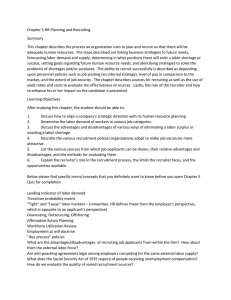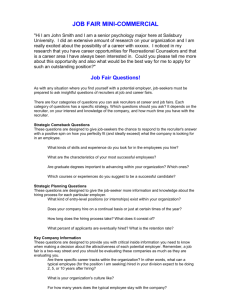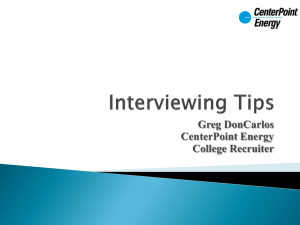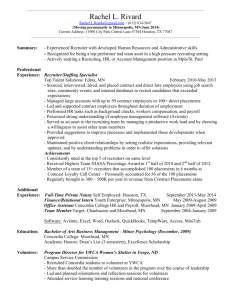Executive Recruiters What is an Executive Recruiter/Search Firm?
advertisement
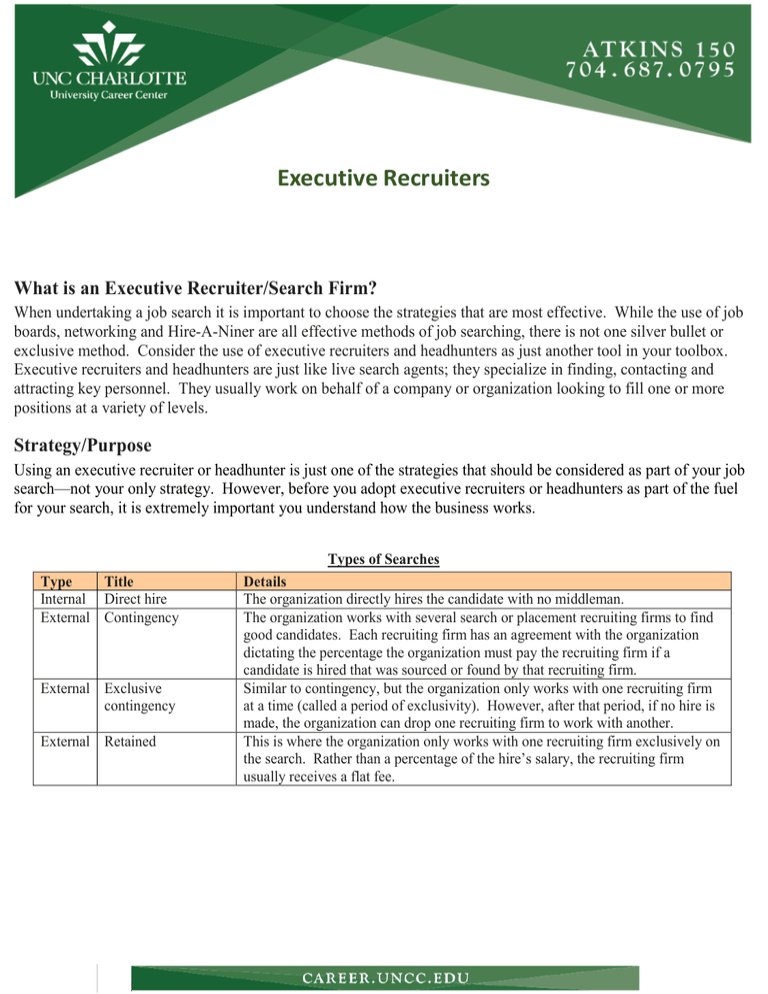
Executive Recruiters What is an Executive Recruiter/Search Firm? When undertaking a job search it is important to choose the strategies that are most effective. While the use of job boards, networking and Hire-A-Niner are all effective methods of job searching, there is not one silver bullet or exclusive method. Consider the use of executive recruiters and headhunters as just another tool in your toolbox. Executive recruiters and headhunters are just like live search agents; they specialize in finding, contacting and attracting key personnel. They usually work on behalf of a company or organization looking to fill one or more positions at a variety of levels. Strategy/Purpose Using an executive recruiter or headhunter is just one of the strategies that should be considered as part of your job search—not your only strategy. However, before you adopt executive recruiters or headhunters as part of the fuel for your search, it is extremely important you understand how the business works. Types of Searches Type Title Internal Direct hire External Contingency External Exclusive contingency External Retained Details The organization directly hires the candidate with no middleman. The organization works with several search or placement recruiting firms to find good candidates. Each recruiting firm has an agreement with the organization dictating the percentage the organization must pay the recruiting firm if a candidate is hired that was sourced or found by that recruiting firm. Similar to contingency, but the organization only works with one recruiting firm at a time (called a period of exclusivity). However, after that period, if no hire is made, the organization can drop one recruiting firm to work with another. This is where the organization only works with one recruiting firm exclusively on the search. Rather than a percentage of the hire’s salary, the recruiting firm usually receives a flat fee. Types of Recruiters Title Goal Temporary Clients depend on these agencies to fill positions quickly. Mostly Agency/Recruitin they run from office administrators and secretaries to data entry g firm clerks. Sometimes they may call at 4pm and need someone for 8:30am the next morning. The recruiter is expected to have someone fill the position. Staffing/ Placement companies fill positions in middle management and Placement technical support positions and have specialists for major business Recruiting firms sectors. Management These consultants offer a variety of services, from outplacement and Consultants personnel to job description creation and recruiting and are different from recruiting recruiting firms who earn money from recruiting fees alone. Clients have longstanding relationships with these consultants and work within the corporate culture to best know the proper fit between candidates and the company. Executive Includes large, worldwide and smaller specialized recruiting firms Recruiter focused mostly on Director level and above positions. Headhunter Another term for a recruiter/executive recruiter Examples Office Team, Todays Temporarys, Randstad, Accountemps etc. Recruiting firms like Robert Half and Technalink. TalentFusion, Search Strategies Inc., CDI Korn/Ferry, Russell Reynolds, Heidrick Struggles, Management Recruiters International N/A Note: Some recruiting firms also offer outplacement or career coaching/counseling services. They will charge for these services. If you need help in this area, contact the University Career Center as we provide similar services for free! THINGS TO AVOID: Never pay an executive recruiter or headhunter, or, work with a recruiting firm that requires you to pay. Recruiters are paid by the company or organization doing the hiring and make their money that way. Avoid pushy recruiters or those who try to steamroll you into interviewing for or taking a job you don’t like or want— it is important to be clear and consistent about the type of role you’re looking for Don’t work with recruiters who want you to lie or mislead readers on your resume; you’re the one that has to perform to your potential in the role and lying or misleading potential employers is never helpful The bottom line? Only work with recruiters and headhunters that make you feel comfortable. Getting Started There are several steps to prepare for and find executive recruiters and search firms: Ensure you know what kinds of positions you are looking for and can articulate well why you’d be good for those positions. It is also very important to be able to indicate the progression you desire and your career path. Prepare a career brief (like a profile), and have your salary history and references ready. Find a specialist in your field. If you are a computer programmer, call a technical recruiting firm. If you’re a CPA, call an accounting search firm. But most of all find a good recruiter (or two) and stick with them. A good agency will be able to tell you if they can help you and can advise you on the best approach to landing the job you want. Pay close attention to “level handled.” That is the salary level they usually work with. For example, if level handled is $100,000 and you’re making $40,000 you should not be working with that recruiter. Recruiters have good information about the job market. Ask the recruiter’s opinions of the market. How do my skills compare? How marketable are they? What can I expect in salary for my skill level and background and education? Am I being realistic? Keep in mind though that the recruiter is in business and will do what he/she can to place you and earn revenue. Ask about the jobs that would be a fit. What is the product/service? What are the essential skills needed? Which are ‘nice-tohave?’ How big is the group/company? Why, specifically, are they interested in my resume? What is the interviewing manager like? Ask about the process. What process do they follow? How often can you expect to hear from them? Do they have references? Will they provide feedback to you from the organization? EXPECTATIONS: Once you decide to work with an executive recruiter or a search firm, the process varies. Typically, for a low or mid-level position, the firm will forward your resume to the hiring organization. If the organization thinks you’re a skills match, the firm will serve as the middleman and work with the organization to schedule the interview(s). For executive recruiters and higher-level positions, the process is often as follows: 1) Candidate Description: the executive recruiter will meet with the hiring organization to get an extensive sense of what the needs are. The recruiter will then write up an extensive candidate description. 2) Sourcing: the recruiter will source or find candidates using various methods including networking, cold calling, industry connections and industry and field research. Interested candidates will be screened by the recruiter. 3) Interviews: the recruiter will screen and interview candidates both on the phone and in-person and will likely narrow down the pool to four – six of the best candidates. 4) Write-ups and Recommendations: the recruiter will then provide a complete write-up and recommendation for each candidate to the hiring organization. Weighing the recruiter’s recommendations carefully, the organization will decide which candidate to formally interview. The recruiter will serve as the middleman in this process 5) If an offer is made, negotiations and decisions will typically be made through the recruiter. Ask as many questions as you need to make an informed decision!
